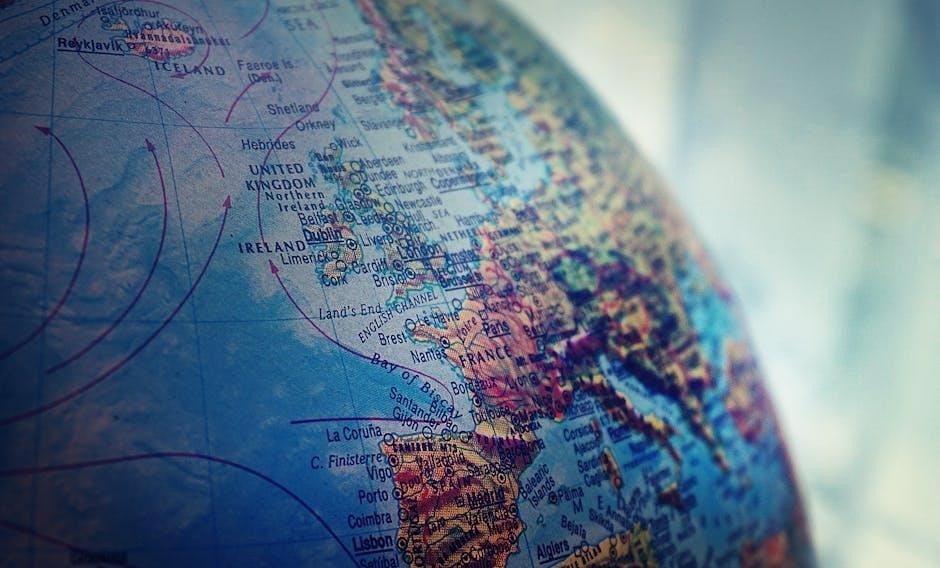This study guide provides an overview of World War 1, including its causes, events, and effects, helping students analyze and understand the war’s significance and impact on history and society today clearly.
Definition and Importance of Studying World War 1
Studying World War 1 is essential for understanding the complexities of modern history and the impact of global conflicts on society.
The definition of World War 1 encompasses a multifaceted analysis of the political, economic, and social factors that led to the war.
Through examining the war’s significance, students can gain insight into the importance of diplomacy, international relations, and global cooperation.
The study of World War 1 also provides a framework for understanding the origins of contemporary global issues, such as nationalism, imperialism, and militarism.
Moreover, analyzing the war’s effects on different nations and cultures can foster empathy and cultural awareness.
By exploring the historical context and consequences of World War 1, students can develop critical thinking skills and a deeper understanding of the complexities of human conflict.
This knowledge can inform decision-making and promote a more nuanced understanding of the world, ultimately contributing to a more peaceful and stable global community.
The importance of studying World War 1 lies in its ability to educate students about the past, while also providing valuable lessons for the present and future.
This study guide aims to facilitate a comprehensive understanding of World War 1, encouraging students to engage with the subject matter and develop a thoughtful and informed perspective.

Causes of World War 1
Complex factors led to World War 1, including alliances and nationalist tensions, sparking global conflict suddenly everywhere.
Long-term Causes Including Systems of Alliances and Nationalism
The long-term causes of World War 1 included complex systems of alliances and nationalist tensions, which ultimately led to the outbreak of war.
These alliances, such as the Triple Entente and the Triple Alliance, created a delicate balance of power in Europe, where one misstep could lead to a larger conflict.
Nationalism also played a significant role, as various ethnic groups sought independence and self-determination, leading to tensions between nations.
The rise of nationalism and the complex system of alliances created an environment in which a small incident could spark a larger war, drawing in multiple nations and empires.
The alliances and nationalist tensions had been building for years, creating a volatile situation that would eventually lead to the outbreak of World War 1.
The study of these long-term causes is essential to understanding the events that led to the war and its subsequent impact on history.
By examining the complex systems of alliances and nationalist tensions, students can gain a deeper understanding of the war and its significance.
This knowledge can also help students analyze the war’s effects and consequences, both short-term and long-term, and how they shaped the world.
The long-term causes of World War 1 are a crucial aspect of the war’s history and continue to be studied by historians and scholars today.
Understanding these causes can provide valuable insights into the nature of war and conflict, and how they can be prevented in the future.
The study of World War 1’s long-term causes is an essential part of any comprehensive study of the war, and is necessary for a full understanding of the conflict and its significance.
Imperialism and Militarism as Contributing Factors
Imperialism and militarism were significant contributing factors to the outbreak of World War 1, as European powers competed for colonies and resources.
The policy of building up military forces and competing for imperial power created an environment of tension and rivalry.
European countries sought to expand their empires and secure new markets and resources, leading to conflicts over territory and influence.
Militarism, or the build-up of military forces, also contributed to the outbreak of war, as countries sought to demonstrate their strength and protect their interests.
The combination of imperialism and militarism created a volatile situation, in which the complex system of alliances and nationalist tensions could be easily exploited.
These factors played a crucial role in the events leading up to the war, and their impact can still be seen today.
The study of imperialism and militarism as contributing factors to World War 1 provides valuable insights into the nature of war and conflict, and how they can be prevented in the future.
By examining these factors, students can gain a deeper understanding of the war and its significance, and develop a more nuanced view of the complex events that led to its outbreak.
This knowledge is essential for understanding the war’s causes and consequences.

Key Events and Battles of World War 1
Major battles and events shaped the war’s outcome and had significant impacts on history and society with lasting effects clearly explained.
Major Battles and Their Impact on the War
The major battles of World War 1 had a significant impact on the war’s outcome and the course of history. These battles, including the Battle of the Somme and the Battle of Verdun, were brutal and devastating, resulting in massive losses on both sides. The use of new technologies, such as tanks and aerial warfare, also played a crucial role in the battles. The impact of these battles was felt not only on the battlefield but also on the home front, where the loss of life and the destruction caused by the war effort took a heavy toll on civilians. The study of these battles is essential to understanding the war and its effects on society. By examining the strategies and tactics employed during these battles, students can gain a deeper understanding of the war and its significance. The battles of World War 1 were a turning point in history, shaping the course of the war and its outcome.

Effects of World War 1
World War 1 had significant effects on society, politics, and economy globally and locally always.
Short-term and Long-term Consequences of the War
The war had both short-term and long-term consequences that affected the world. In the short term, the war led to the loss of millions of lives, widespread destruction, and a significant economic burden on many countries. The war also led to the downfall of several empires, including the German, Austro-Hungarian, and Ottoman Empires. In the long term, the war led to a significant shift in the global balance of power, with the United States and the Soviet Union emerging as superpowers. The war also led to the formation of the League of Nations, which was established to promote international cooperation and prevent future wars. Additionally, the war led to significant social and cultural changes, including the rise of feminism and the decline of traditional social norms. The consequences of the war are still studied and debated by historians and scholars today, and its impact can still be felt in many parts of the world. The study of the war’s consequences is an important part of understanding the complexities of modern history.

Key Figures of World War 1
Notable leaders played crucial roles, including Kaiser Wilhelm and Woodrow Wilson, shaping history with decisions and actions during the war period effectively always.
Leaders and Their Roles in the War
The war involved many notable leaders, each playing a significant role in shaping the course of history. Kaiser Wilhelm of Germany, for example, was a key figure, with his aggressive foreign policy contributing to the outbreak of war. Woodrow Wilson, the President of the United States, also played a crucial role, particularly in the later stages of the war. Other important leaders included David Lloyd George of Britain, Georges Clemenceau of France, and Vittorio Orlando of Italy. These leaders, along with others, made significant decisions and took actions that impacted the war and its outcome. Their roles and decisions are still studied today, providing valuable insights into the complexities of the war and its far-reaching consequences. The study of these leaders and their roles is essential to understanding the war and its significance in modern history, and is a key component of any comprehensive study guide on the topic of World War 1.
